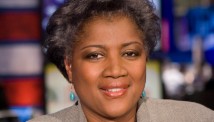Editor's note: Donna Brazile, a CNN contributor and a Democratic strategist, is vice chairwoman for voter registration and participation at the Democratic National Committee. She is a nationally syndicated columnist, an adjunct professor at Georgetown University and author of "Cooking with Grease: Stirring the Pot in America." She was manager for the Gore-Lieberman presidential campaign in 2000.
(CNN) -- 2014 is shaping up to be a pivotal political year for Republicans.
Voters in a handful of GOP primaries will have to decide if Washington will move toward responsible partisanship, or if the Capitol slides further into polarization, shutdowns, manufactured crises and other forms of dysfunction.
The battle has already begun.
 Donna Brazile
Donna Brazile Karl Rove, the political wizard behind George W. Bush's campaigns, is engaging his American Crossroads Super PAC to take down any primary challengers to the GOP establishment's candidates. He's formed a group called the Conservative Victory Project to screen and recruit candidates the establishment likes for House and Senate seats.
Although Rove unsuccessfully spent hundreds of millions of dollars on former Massachusetts Gov. Mitt Romney and other federal candidates in 2012, the U.S. Chamber of Congress joined efforts with Rove recently to elect candidates who favor big business and to defeat tea party, evangelical and libertarian candidates.
"Our object is to avoid having stupid candidates who can't win general elections," Rove said on Fox News. Scott Reed, a longtime Republican strategist and spokesman for the U.S. Chamber of Commerce, told The Wall Street Journal, "Our No. 1 focus is to make sure ... that we have no loser candidates. That will be our mantra: No fools on our ticket."
The Chamber of Commerce plans to spend at least $50 million in 2014 Republican primaries. That's not much by current standards, but it's provoked a reaction.
"It's insane," Cleta Mitchell, Washington attorney and conservative activist told Newsmax. "That's fine if they want to spend that money, but I think it's going to be wasted."
The Club for Growth, a big player in right-wing politics, isn't happy with Rove's declaration of intraparty warfare. The club's president, Chris Chocola, called the Rove-U.S. Chamber alliance "misguided in many respects." After affirming their right to free speech, Chocola added, "The problem with a lot of the groups is that they don't really care about what the candidates believe."
In other words, the Rove groups find big-business, big-government candidates acceptable as long as they're Republican.
It's a little surreal to hear Rove and Reed insulting the tea party, while "credentialed conservatives" respond in polite and measured tones, but that's where we are. This will likely continue.
Rove, a master at holding and stating diametrically opposed positions at the same time, predicted Republican unity while declaring victory in the battle to win over Republican voters who comprise the base of the party.
"Every Republican senator and virtually every representative challenged in a primary as insufficiently conservative will win," he wrote -- an in-your-face prediction aimed at the Club for Growth, tea party Republicans and anyone dissatisfied with Rove's "winning for big business" strategy.
In reaction, the Club for Growth started a website that urges voters to "primary" their congressperson; that is, run candidates against Washington Republican officeholders. However we slice it, ultraconservative, small-business, small- government Republicans are opposing establishment Republicans who are big- business, big-government conservatives. (There are only a handful of true Republican moderates left in Congress).
To put this in perspective, let me recount a little recent history.
After the 2008 election, the Republican Party was so unpopular that in response, Rove and others decided to capitalize on the nascent tea party movement, using the Republican Party's structure, connections and money to propel it into a viable political force.
Rove, in a 2010 column, advised independents who identified with the tea party movement to remain apart from the Republican Party and to "begin the difficult task of disassociating themselves from cranks and conspiracy nuts."
Rove's intent -- and that of the Republican establishment -- was to manipulate the tea party movement into kicking out Republican Party ultraconservatives. That failed.
Independents stayed where they were, in the middle, unassociated with either party or the tea party movement. However, tea party organizers (almost all of them Republicans) captured a sizable portion of the Republican base, appealing better than the establishment to libertarians and evangelicals.
This is why the Republican Party now finds itself in a civil war.
Tea Party identifiers, libertarians and evangelicals keep separate identities, but they pretty well agree they don't like the establishment, which includes Mitch McConnell, John Boehner and anyone who associates too closely with them.
For decades, the Republican establishment ran candidates in primaries who "talked the talk" of ultraconservatives but switched to more moderate talk for the general election, and after election, voted less conservatively. As gerrymandering isolated congressional districts into almost pure Republican or Democratic constituencies, both parties began to nominate fewer and fewer centrist candidates.
Now, groups such as the Club for Growth, the Madison Project and the Tea Party Leadership Fund, among others, want to toss out big-business conservatives because time and practice have proved them untrustworthy to deliver on primary promises.
The irony of this internal warfare is that GOP establishment leaders are the ones who have schooled the tea party Republicans in the tactics of extreme partisan gridlock to achieve maximum political gain. Now, the establishment is running against the tea party as if they were the political extremists.
Get ready for a showdown.
Follow us on Twitter @CNNOpinion.
Join us on Facebook.com/CNNOpinion.
{ 0 comments... read them below or add one }
Post a Comment